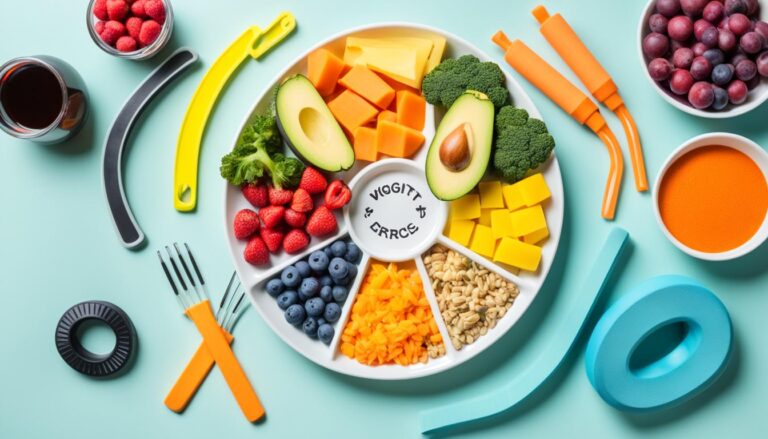Are you tired of trying countless diets and weight loss methods without seeing the results you desire? It’s time to take a fresh approach and discover the strategies that truly work.
In this article, we will delve into the world of diet and weight loss, exploring effective tips and techniques to help you achieve your goals.
From creating healthy eating plans that satisfy your taste buds to finding motivation when faced with setbacks, we’ve got you covered. So, are you ready to unlock the secrets to successful weight loss?
Key Takeaways:
- Setting realistic weight loss goals is crucial for long-term success.
- Crafting healthy eating plans can help you make sustainable changes to your diet.
- Exercise plays a critical role in achieving weight loss goals and boosting metabolism.
- Weight loss medications should be used under the guidance of healthcare professionals.
- Building a strong support system can help you stay motivated and accountable throughout your journey.
Understanding Realistic Weight Loss Goals
Setting realistic weight loss goals is crucial for your success. It’s important to understand that weight loss takes time and effort, and setting achievable goals can help you stay motivated.
Research shows that setting specific goals is more effective than vague goals. It’s important to be specific about the amount of weight you want to lose and the timeframe in which you want to achieve it.
How to Craft Healthy Eating Plans
Crafting healthy eating plans is a key component of successful weight loss. It involves creating a balanced and nutritious meal plan that includes a variety of foods to meet your body’s needs.

Low-Calorie Recipes for Every Meal
Including low-calorie recipes in your meal plan can help you reduce your calorie intake while still enjoying delicious meals. These recipes often focus on incorporating nutrient-dense foods and reducing added sugars and fats.
Nutrition for Sustainable Fat Loss
Nutrition plays a vital role in sustainable fat loss. It’s important to focus on consuming a variety of nutrient-rich foods that support your weight loss goals and provide the necessary energy and nutrients for your body.
| Benefits of Understanding Realistic Weight Loss Goals | Benefits of Healthy Eating Plans | Benefits of Low-Calorie Recipes | Benefits of Nutrition for Sustainable Fat Loss |
|---|---|---|---|
| Stay motivated | Meet your body’s needs | Reduce calorie intake | Support weight loss goals |
| Set achievable goals | Create a balanced meal plan | Enjoy delicious meals | Provide necessary energy and nutrients |
| Track weight loss progress | Incorporate variety in your diet | Increase nutrient density | Facilitate sustainable fat loss |
Effective Weight Loss Tips for Long-Term Success
When it comes to achieving your weight loss goals, adopting healthier lifestyle changes is key. It’s not just about going on a temporary diet, but making sustainable changes to your eating habits, exercise routine, and overall lifestyle. By focusing on long-term strategies, you can set yourself up for success and maintain your weight loss progress over time.
Adopting Healthier Lifestyle Changes
Effective weight loss goes beyond just counting calories or following the latest fad diet. It’s about making lasting changes to your daily habits that promote a healthier lifestyle. This includes incorporating more whole foods, such as fruits, vegetables, lean proteins, and whole grains, into your meals. Experiment with different flavors and recipes to keep your meals interesting and satisfying.

Additionally, finding enjoyable forms of exercise that you can incorporate into your routine is important for long-term success. Whether it’s going for a jog, taking a dance class, or practicing yoga, find activities that you genuinely enjoy. Making exercise a regular part of your life will not only help you burn calories but also improve your overall health and well-being.
Overcoming Common Weight Loss Challenges
Weight loss journeys often come with their fair share of challenges. From emotional eating to dealing with cravings and hitting plateaus, it’s important to address these obstacles head-on. By developing healthy coping mechanisms and finding strategies that work for you, you can overcome these common challenges and stay on track.
One approach is to identify the triggers that contribute to emotional eating and find alternative ways to manage your emotions. This can include engaging in stress-relief activities like meditation or practicing mindful eating, where you pay attention to the physical sensations and emotions associated with eating.
Another strategy is to have a plan in place for dealing with cravings. This might involve keeping healthy snacks on hand, practicing portion control, or finding healthier alternatives to your favorite indulgent foods. Remember, it’s okay to enjoy treats in moderation, but finding balance is key.
Plateaus can also be frustrating, but they are a normal part of the weight loss process. When you hit a plateau, consider mixing up your exercise routine, trying new workouts, or consulting with a fitness professional for guidance. Making small adjustments to your diet, such as increasing your water intake or incorporating more fiber-rich foods, can also help break through plateaus.
Maximizing the Benefits of Calorie Tracking
Calorie tracking can be a powerful tool for weight loss. By monitoring your calorie intake and expenditure, you gain insight into your eating patterns and can make adjustments as needed. This accountability can help you stay on track and make more informed choices.
There are various methods for tracking calories, from writing them down in a journal to using smartphone apps or online trackers. Find the approach that works best for you and be consistent with your tracking. It’s essential to be honest with yourself and accurately record your intake to get an accurate picture of your habits.
Tracking your calories can also help you identify areas where you may be overindulging or where you might benefit from making healthier choices. For example, you might realize that you tend to snack mindlessly while watching television or that you consistently consume more calories at dinner than other meals. Armed with this information, you can make targeted adjustments to support your weight loss goals.
Diet and Weight Loss: A Comprehensive Approach
Taking a comprehensive approach to weight loss is essential for achieving long-term success. By combining various strategies, you can optimize your results and improve your overall well-being. In this section, we will explore the best diet strategies for weight loss, the importance of pairing exercise with nutrition, and the significance of balanced eating for weight management.
Best Diet Strategies for Weight Loss
When it comes to finding the best diet for weight loss, it’s important to remember that no one-size-fits-all approach exists. Each individual has unique preferences and needs. However, there are common principles that can guide you in crafting an effective diet plan.
Focus on consuming whole, unprocessed foods as the foundation of your diet. These foods are rich in nutrients, low in added sugars and unhealthy fats, and can help you feel satisfied. Additionally, creating a calorie deficit by consuming fewer calories than you burn is crucial for weight loss.
Experiment with different diet approaches such as the Mediterranean diet, low-carb diet, or intermittent fasting, and choose the one that aligns best with your lifestyle and preferences.
Pairing Exercise and Nutrition for Optimal Results
To maximize your weight loss efforts, it’s important to pair exercise with proper nutrition. Regular physical activity not only helps burn calories but also boosts your metabolism and builds muscle mass, which is important for long-term weight management.
Engage in a variety of exercises that you enjoy, such as cardio, strength training, and flexibility exercises. Find activities that fit your schedule and lifestyle, whether it’s going for a run, attending fitness classes, or even incorporating more movement into your daily routine.
Combine exercise with a balanced diet that provides the necessary nutrients to support your workouts. Ensure you’re getting adequate protein to repair and build muscles, healthy fats for energy, and a variety of fruits and vegetables for essential vitamins and minerals.
Weight Management Through Balanced Eating
Achieving weight management requires finding a balance between calorie intake and expenditure. Balanced eating involves consuming a variety of foods from all food groups in appropriate portions. This approach ensures that your body receives the necessary nutrients while still creating a calorie deficit for weight loss.
Pay attention to portion sizes and practice mindful eating. Savor your meals, eat slowly, and listen to your body’s hunger and fullness cues. Avoid skipping meals or drastically restricting your calorie intake, as these habits can negatively impact your metabolism and lead to nutrient deficiencies.
Remember that sustainable weight loss is a journey, and it’s important to prioritize your overall health and well-being above all. By adopting a comprehensive approach to diet and weight loss, you can achieve your goals and maintain a healthy lifestyle in the long run.

Implementing Effective Meal Planning Strategies
Effective meal planning is a crucial aspect of successful weight loss. By carefully planning and organizing your meals, you can ensure that you have nutritious and healthy options readily available throughout the week. This helps you avoid making impulsive and unhealthy food choices when you’re hungry or busy.
One sustainable meal prepping technique is batch cooking. By preparing larger quantities of food at once, you can save time and have multiple meals ready to go. This can include cooking a large batch of roasted vegetables, grilled chicken, or quinoa that you can use in different recipes throughout the week.
Another technique is portioning meals. By dividing your meals into appropriate-sized containers or bags, you can easily grab a pre-portioned meal when you’re on-the-go or at work. This helps you practice portion control and avoid overeating.
Utilizing storage containers is also beneficial for meal prepping. Invest in a variety of containers in different sizes to accommodate different meal sizes and leftovers. This helps you organize and store your prepared meals, making it easier to grab and go.
Importance of Planning and Tracking
Planning and tracking your meals and calorie intake play a key role in weight loss progress and success. Keeping a food diary or using a meal tracking app helps you stay accountable and aware of what you’re consuming.
“By tracking your meals, you can identify patterns, pinpoint areas for improvement, and make necessary adjustments to your eating habits.”
Meal planning and tracking not only help you manage your calorie intake but also ensure that you’re getting a balanced and nutritious diet. It allows you to make informed decisions about your meals, ensuring that you’re meeting your nutritional needs while staying within your calorie goals.
Utilizing Technology for Meal and Calorie Tracking
Technology can be a valuable tool for meal and calorie tracking, making the process easier and more convenient. There are various apps and software available that can help you plan and track your meals, count calories, and monitor your progress.
![]()
Using meal tracking apps allows you to create and customize your meal plans, track your calorie intake, and even set reminders for meal times. These apps often provide nutritional information for a wide range of foods, making it easier to make informed choices.
Additionally, some apps offer features that allow you to track your exercise, hydration, and sleep patterns, providing a more comprehensive overview of your overall health and wellness.
| Benefits of Utilizing Meal Tracking Technology |
|---|
| Convenient and accessible on mobile devices |
| Accurate and up-to-date nutritional information |
| Ability to track progress and set goals |
| Provides reminders and notifications |
| Offers features for exercise and hydration tracking |
Finding Your Weight Loss Motivation
– Finding and maintaining weight loss motivation is crucial for long-term success. It’s important to identify your personal reasons for wanting to lose weight and set realistic goals that are meaningful to you.
– Staying motivated can be challenging, but finding strategies that work for you, such as visualizing your goals, rewarding yourself, or seeking support from friends and family, can help you stay on track.

Exercise Essentials for Boosting Metabolism in Weight Loss
When it comes to losing weight, exercise is a crucial component that can help you reach your goals. Not only does exercise burn calories, but it also plays a significant role in boosting your metabolism. By incorporating regular physical activity into your routine, you can rev up your metabolism and maximize your weight loss efforts.
Exercise for weight loss doesn’t have to be complicated or time-consuming. In fact, incorporating simple yet effective metabolism-boosting exercises can help you achieve remarkable results. Here are some exercise essentials to consider:
- Cardiovascular exercise: Engage in activities that get your heart rate up, such as running, swimming, cycling, or dancing. These exercises not only burn calories during the workout but also have a lasting effect on your metabolism, keeping it elevated even after you’ve finished exercising.
- Strength training: Build lean muscle mass with strength training exercises like weightlifting or bodyweight exercises. Muscle is more metabolically active than fat, so the more muscle you have, the more calories you burn at rest.
- High-intensity interval training (HIIT): Incorporate bursts of intense exercise followed by short periods of rest. HIIT workouts are known to increase your heart rate and metabolism, helping you burn calories long after the workout is over.
- Resistance training: Incorporate resistance exercises like squats, lunges, and push-ups to challenge your muscles. This can help increase your muscle mass and boost your metabolism.
To get the most out of your exercise routine, aim for a combination of cardiovascular exercise, strength training, HIIT, and resistance training. This comprehensive approach will not only help you burn calories during your workouts but also enhance your metabolism so that you continue to burn calories even at rest.
Remember, consistency is key when it comes to exercise for weight loss. Aim for at least 150 minutes of moderate-intensity exercise or 75 minutes of vigorous-intensity exercise each week, along with strength training exercises on two or more days.
So, lace up your sneakers, find activities you enjoy, and make exercise an essential part of your weight loss journey. Not only will it help you shed those extra pounds, but it will also boost your metabolism and contribute to overall health and well-being.
Nutrition: The Key Ingredient for Weight Loss
When it comes to achieving your weight loss goals, nutrition plays a crucial role. By focusing on consuming nutrient-dense foods, practicing portion control, and making mindful food choices, you can support your weight loss journey and improve your overall health.
Eating a diet rich in nutrient-dense foods provides your body with essential vitamins, minerals, and antioxidants while keeping calorie intake in check. These foods are high in nutrients and low in calories, helping you feel satisfied and nourished without overeating. Incorporating foods such as leafy greens, lean proteins, whole grains, and fruits and vegetables can provide a solid foundation for your weight loss efforts.
Practicing portion control is also important for managing your calorie intake. It’s easy to overeat, especially when faced with tantalizing treats or large portion sizes. By being mindful of portion sizes and listening to your body’s hunger cues, you can better control your calorie intake and prevent overeating. Remember, it’s not just what you eat but how much you eat that matters for weight loss.
“Nutrition is the key ingredient for weight loss success. Remember, it’s not just what you eat but how much you eat that matters for weight loss.”
Incorporating healthy eating tips into your daily routine can also enhance your weight loss efforts. Some helpful tips include cooking at home more often, choosing whole foods over processed ones, staying hydrated, and being mindful of added sugars and fats. Small, sustainable changes to your eating habits over time can make a big difference in achieving your weight loss goals.
By prioritizing nutrition and making conscious choices about the foods you eat, you can fuel your body with the nutrients it needs for optimal health and weight management. Remember, weight loss is a journey, and adopting healthy eating habits is an essential component of long-term success. Combined with regular exercise and other lifestyle changes, nutrition sets the foundation for a healthy, sustainable weight loss journey.
| Nutrient-Dense Foods | Portion Control Tips |
|---|---|
| Leafy greens | Eat slowly and savor each bite |
| Lean proteins (chicken, fish, tofu) | Use smaller plates and bowls |
| Whole grains (quinoa, brown rice) | Measure servings to avoid overeating |
| Colorful fruits and vegetables | Pay attention to hunger and fullness cues |
| Nuts and seeds | Avoid distractions while eating |
| Healthy fats (avocado, olive oil) | Plan meals and snacks in advance |
Understanding the Role of Weight Loss Medications
Weight loss medications can be a valuable option for individuals who have not achieved their weight loss goals through diet and exercise alone. However, it’s important to understand the role of these medications and how they can be used effectively and safely.
When to Consider Prescription Options
Prescription weight loss medications should be considered when other methods, such as diet and exercise, have been unsuccessful in achieving desired weight loss results. These medications may be recommended for individuals with a body mass index (BMI) above a certain threshold or for those who have obesity-related health conditions.
It’s important to consult with healthcare professionals, such as doctors or registered dietitians, to determine if prescription options are appropriate for your specific situation. They will consider your medical history, current medications, and overall health to assess the suitability of weight loss medications.
Supplementing Diet and Exercise with Medication
Weight loss medications should not be relied upon as the sole method for weight loss. They are designed to be used as a supplement to a healthy diet and regular exercise routine.
When combined with a nutritious eating plan and an active lifestyle, weight loss medications may help to enhance weight loss efforts. They can assist in appetite control, metabolism regulation, or fat absorption reduction, depending on the specific medication prescribed.
However, it’s important to note that weight loss medications are not a quick fix or a substitute for healthy habits. They should be used in conjunction with lifestyle changes to achieve sustainable results.
Consulting Healthcare Professionals for Safe Use
Prior to initiating weight loss medication, it is crucial to consult with healthcare professionals to ensure safe and effective use. They can provide guidance on the ideal medication options and provide instructions on dosage, potential side effects, and interactions with other medications.
Healthcare professionals, such as doctors or pharmacists, can also monitor your progress, address any concerns, and offer support throughout your weight loss journey. Regular check-ins and follow-ups are vital to ensure that the medication is working as intended and to make any necessary adjustments to the treatment plan.
Overall, weight loss medications can be a valuable tool for individuals who are struggling to achieve their weight loss goals. However, they should only be used under the guidance and supervision of healthcare professionals. By combining weight loss medications with a comprehensive approach that includes healthy eating, regular exercise, and lifestyle changes, you can increase your chances of successful and sustainable weight loss.
Building a Support System for Your Diet and Weight Loss Journey
Embarking on a diet and weight loss journey can be challenging, but you don’t have to do it alone. Building a support system is crucial for maintaining motivation and accountability. Whether it’s seeking support from friends and family or joining online communities and support groups, having others by your side can make a significant difference.
Seeking support from loved ones can provide you with the encouragement and understanding you need during this journey. They can celebrate your successes, offer words of wisdom, and hold you accountable when things get tough. Sometimes, all you need is a listening ear or a cheerleader on your side to keep you motivated.
Online communities and support groups can also be an excellent source of support. Connecting with individuals who share similar goals and experiences can provide valuable insights, tips, and encouragement. It’s a platform to share your journey, celebrate milestones, and seek advice from people who understand what you’re going through.
Remember, a problem shared is a problem halved. Surround yourself with like-minded individuals who can lift you up, inspire you, and help you navigate the challenges along the way.
Being part of a supportive community can also provide you with new ideas, resources, and inspiration to keep pushing forward. It’s a reminder that you’re not alone in your weight loss journey and that others have faced similar obstacles and overcome them.
Together, we can achieve more than we can on our own. Don’t hesitate to reach out and take advantage of the incredible support systems available to you.
Conclusion
Summarizing the Journey to Achieving Diet and Weight Loss Goals
In conclusion, embarking on a weight loss journey requires dedication, discipline, and the implementation of various strategies. By setting realistic goals, crafting healthy eating plans, adopting effective meal planning techniques, finding motivation, incorporating exercise, considering weight loss medications, and building a support system, you can increase your chances of success.
Throughout this article, we’ve discussed the importance of setting specific and achievable weight loss goals, creating balanced and nutritious meal plans, and including low-calorie recipes in your diet. We’ve also explored the role of exercise in boosting metabolism and weight loss, as well as the benefits of tracking your calorie intake and expenditure.
To maintain your health and weight loss achievements, it’s important to continue practicing the strategies discussed here. Celebrate the progress you’ve made and stay committed to a sustainable lifestyle that includes healthy eating, regular exercise, and emotional support from your loved ones or online communities.
Next Steps to Maintain Your Health and Weight Loss Achievements
As you move forward in your weight loss journey, remember to prioritize self-care and develop strategies to overcome any challenges that may arise. Consider speaking with healthcare professionals for personalized advice and guidance, especially when it comes to weight loss medications or supplements.
Keep track of your progress, celebrate your victories, and don’t be too hard on yourself during setbacks. Journey to a healthier you, maintain your weight loss achievements, and embrace a balanced lifestyle that supports your overall well-being.





